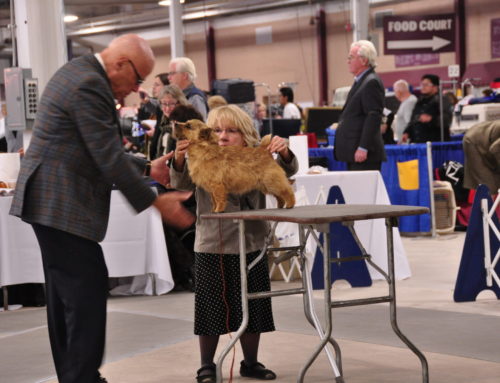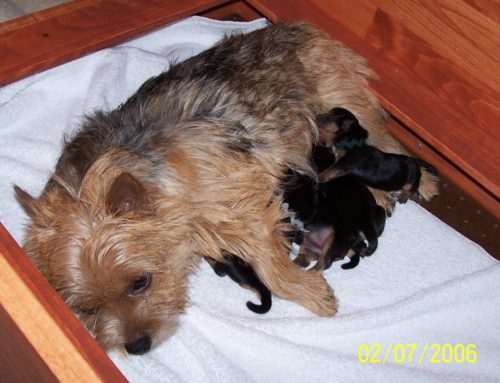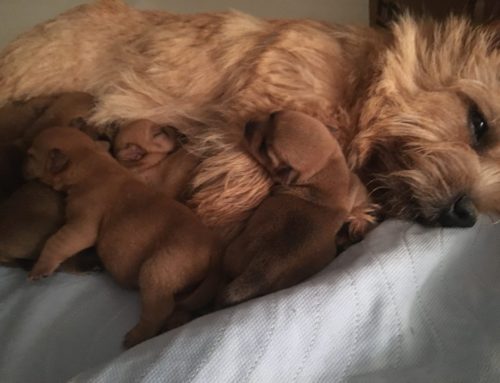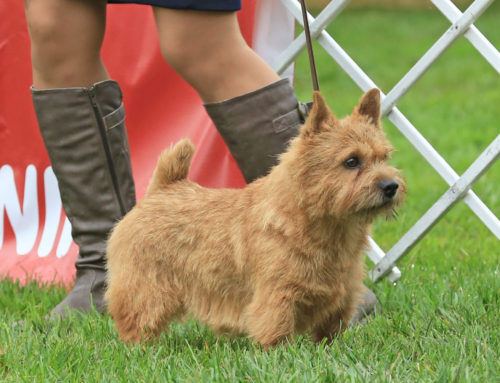 As breeders we often get inquiries from people who want to add a purebred pet Norwich Terrier to their family and who specify that they want “just a pet, not a show dog.” Sometimes the person has the impression that a “pet” puppy will cost less. But, what exactly is meant by a “pet” versus “show” quality puppy?
As breeders we often get inquiries from people who want to add a purebred pet Norwich Terrier to their family and who specify that they want “just a pet, not a show dog.” Sometimes the person has the impression that a “pet” puppy will cost less. But, what exactly is meant by a “pet” versus “show” quality puppy?
Although the definition of “pet” versus “show” quality may vary depending on the breeder, at the very least a show quality dog should have no disqualifying faults. Disqualifying faults are clearly defined or measurable and are specified in the AKC-approved Breed Standards—the standards of excellence by which purebred dogs are to be bred and judged. There are no disqualifying faults listed for Norwich Terriers. Other faults of special concern to dog breeds (e.g., a level or undershot bite in a Norwich Terrier) are implicit from the positive description of the dog (“A scissor bite.”), or explicitly cited in their description (“White marks are not desirable.”).
A dog’s appearance is evaluated in relation to the ideal specimen as defined by its breed standard and is often a matter of degree. Thus, beyond any faults or disqualifications that would prevent a puppy from being able to exhibit in the show ring, individual breeders may use different criteria to determine which puppies are show quality prospects versus those that will go to pet or companion homes. That said, the health and temperament of the Norwich Terrier are paramount. The term “pet quality” should not represent a puppy with health or temperament problems that would impact the dog’s quality of life. In fact, temperament is described in the breed standard for Norwich Terriers: “Gay, fearless, loyal and affectionate. Adaptable and sporting, they make ideal companions.”
My preferred definition of a pet puppy is one that would have difficulty finishing its championship (meaning in competition with dogs representing the breed and assuming knowledgeable judging). No doubt this definition stems from personal experience buying my first so-called show dog, a Pembroke Welsh Corgi whose price was a bit more than her lesser quality littermates. Later, a renowned pem corgi breeder kindly advised that my show puppy would have difficulty winning the major awards needed for a championship title. So, she was spayed and I was spared the heartbreak of breeding mediocre corgis. I learned that it’s a breeder’s best judgment as to whether a puppy varies from its breed standard in such a way that it should not be shown (or bred), and different breeders have different opinions. Dog shows actually began when breeders simply got together to compare their breeding stock and someone they all respected decided who had the best dogs. The criteria for judging has been controversial since the first modern show, held June 1859 in Newcastle-upon-Tyne as an added attraction to the annual cattle show, when reportedly sporting dogs were assessed on their look and shape, rather than their abilities in the field (BBC History Magazine, June 2009).
Although conformation may be of little importance to the pet family, prospective pet owners are wise to seek out a reputable show breeder—one who breeds for good temperament, does recommended health screening on breeding stock, and is likely to produce healthy dogs. Reputable breeders register their puppies with the AKC, are involved in the activities of the AKC and their parent clubs and strive for the betterment of the breed. In some litters, there may be something about a puppy that the breeder does not want to keep in the breeding program (e.g., eyes round or pigment not dark enough; lacking well-turned stifles). Sometimes breeders are fortunate to have a litter with little difference between the puppies. All may be worthy show prospects, but some not quite as good as their littermates and the breeder may choose to place those show quality puppies in companion homes. To the reputable breeder, pet puppies should not be bred and are sold with AKC “limited” registrations, but they are no less desirable than their conformation show quality littermates; they will share the same genes for good health and temperament. Reputable breeders stand behind their puppies and will accept the return of a puppy with a health problem or, in the future, if the purchaser can no longer keep the Norwich Terrier. Above all, reputable breeders care about the welfare of the puppies they breed.
Jane R. Schubart, AKC Gazette Breed Columnist ascot.js@gmail.com; The Norwich Terrier Club of America website: www.norwichterrierclub.org (717) 635-8464





